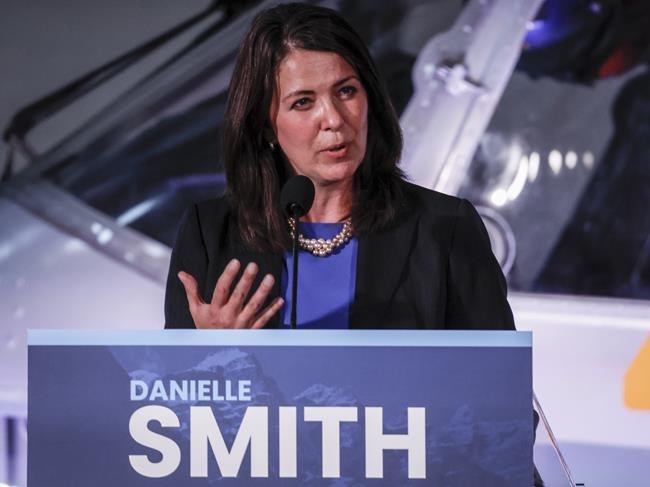EDMONTON ŌĆö The top adviser to incoming Alberta premier Danielle Smith says her proposed sovereignty act would respect Supreme Court decisions ŌĆō a reversal of her core policy promise on how she would challenge Prime Minister Justin TrudeauŌĆÖs government.
Rob Anderson, SmithŌĆÖs campaign chair for the United Conservative Party leadership and now executive director of her transition team, told CBC in a story published Saturday that SmithŌĆÖs proposed sovereignty act wonŌĆÖt empower Alberta to disregard Supreme Court rulings.
But Anderson promised that the act, which has yet to be drafted, would ŌĆ£have a whole head of very sharp teethŌĆØ and ŌĆ£change the dynamicŌĆØ with TrudeauŌĆÖs Liberal government.
SmithŌĆÖs spokesman Jonah Mozeson, responding to an email request for comment Monday, declined to answer specific queries about AndersonŌĆÖs statement.
In a short statement, Mozeson said, ŌĆ£As the premier-designate has said, the sovereignty act will be drafted in accordance with sound constitutional principles.
ŌĆ£The premier-designate looks forward to working with caucus to draft legislation that protects and asserts AlbertaŌĆÖs constitutional rights in accordance with the rule of law.ŌĆØ┬Ā
The sovereignty act is the signature policy for Smith, who is to be sworn in as premier Tuesday.┬Ā
She won the UCP leadership race last week showcasing the act as a vanguard of a broader paradigm-busting challenge against what she has termed TrudeauŌĆÖs "lawless" intrusion in areas of provincial scope, ranging from energy development to COVID-19 health rules.┬Ā
The act as proposed by Smith would allow the province to refuse to follow federal laws and court rulings it deemed to be not in AlbertaŌĆÖs best interests and an illegal intrusion into its duly delegated spheres of influence under the Constitution.
As recently as a month ago, Smith said the sovereignty act would only be used in special circumstances using "special motions" requiring the consent of the legislature.┬Ā
She also stressed Alberta would not consider itself bound by the courts.┬Ā
ŌĆ£If a court stays or ultimately deems that the actions undertaken by the province under a specific Alberta sovereignty act special motion is unconstitutional, then the government and legislature will have to review the special motion actions in question and make a decision as to whether or not to amend, end or continue with them, understanding the legal implications such a decision could cause,ŌĆØ Smith said in a news release Sept. 6.┬Ā
The sovereignty act dominated the debate throughout the summer-long leadership campaign to replace Jason Kenney as party leader and premier.
It was denounced by five of Smith's six leadership rivals, and by Kenney, as a profoundly illegal and dangerous plan doomed to ignite economic chaos as Albertans, investors and businesses wouldnŌĆÖt know which laws they were to follow.
Alberta Lt.-Gov. Salma Lakhani entered the debate at one point, saying she is duty-bound not to sign into law a bill that violates the Constitution.┬Ā
Martin Olszynski, an administrative law professor at the University of Calgary, who has written articles on the sovereignty act, said if AndersonŌĆÖs reversal is as advertised, it is the legally proper way to proceed but represents a fundamental rollback of SmithŌĆÖs original proposal.
ŌĆ£All of the sovereignty act, as it has been currently described, could only work if the premier and the legislature were prepared to ignore the courts. ThatŌĆÖs been very clear. ThatŌĆÖs why everybody was so alarmed,ŌĆØ said Olszynski in interview.┬Ā
ŌĆ£We have to see the details, of course,ŌĆØ he added.┬Ā
ŌĆ£But if suddenly now the premier-designate and her office are prepared to say, 'of course we're bound by the courts,' then the sovereignty act goes nowhere.ŌĆØ┬Ā
Smith said the sovereignty act will be introduced in the upcoming fall session.┬Ā
It grew out of the Free Alberta Strategy, a policy paper introduced last September by Anderson, University of Calgary political science professor Barry Cooper and lawyer Derek From.
In the paper, the trio call for radical action, such as refusing to implement federal laws and court rulings, in order to combat decisions deemed to be mortally wounding Alberta's development.
Cooper, in a June newspaper op-ed, said the unconstitutionality of such a proposal is not a bug in the program but its primary feature.
In a National Post story published June 17, Anderson was quoted saying, ŌĆ£The idea is that it doesnŌĆÖt matter what the Supreme Court or the federal government says about it, if it attacks Albertans, the interest of Albertans, and it attacks our jurisdictional rights, we simply wonŌĆÖt enforce it with any provincial agency.ŌĆØ
Anderson told the newspaper at that time that he expected the sovereignty act would likely be found unconstitutional but the province could ignore such a court ruling.
ŌĆ£The Alberta legislature would say, ŌĆśThanks for that, but weŌĆÖre not going to enforce it. So you canŌĆÖt make us.' And what are they going to do? Maybe send in the army? Is that the plan?ŌĆØ said Anderson.
This report by The Canadian Press was first published Oct. 10, 2022.
Dean Bennett, The Canadian Press



